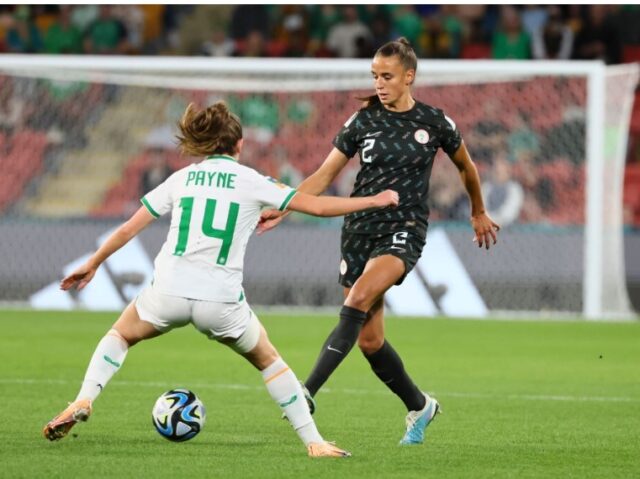Ashleigh Plumptre, a prominent figure in Nigeria’s football squad, has voiced her frustration over persisting stereotypes surrounding African football teams.
Read Also: Glory Ogbonna Laments Early Exit from Women’s FIFA World Cup in Brisbane
Plumptre, who played a pivotal role in Nigeria’s recent clash against European champions England in the World Cup last-16 tie, believes it’s time to shatter preconceived notions and redefine the narrative.
In the thrilling encounter that ultimately led to a penalty shootout in favor of England, Plumptre’s prowess was evident. Following the match, the 25-year-old athlete shared her sentiments, emphasizing the pride she feels for her team’s performance.
“Against all odds, we faced England head-on,” Plumptre asserted. “Our team was often underestimated, labeled as underdogs. But this game demonstrated that we are more than just ‘strong’ and ‘fast’. We possess technical and tactical finesse that demands recognition.”
The exhaustion of hearing repetitive stereotypes regarding African teams, such as being solely characterized by physicality, has driven Plumptre to advocate for a new perspective. “We matched England, and I dare say, we had better opportunities,” she declared with conviction.
Although Plumptre’s football journey began in Leicester, England, and she once represented her birth country at youth level, her affiliation with Nigeria through her paternal grandfather has enriched her connection with the nation. Since her debut for Nigeria last year, Plumptre has been instrumental in shaping the team’s identity.
“This match was a statement,” she affirmed. “Our accomplishments won’t fade away; they will form the foundation for our future endeavors. The bar has been raised; we are now expected to progress further, consistently challenging and pushing boundaries. Our belief in ourselves combined with the support we deserve can propel us to remarkable heights.”
In response to England’s performance, former French international Laura Georges, contributing to the BBC’s coverage of the game, commended Nigeria’s strategic prowess. “Nigeria displayed exceptional organization and strength as a team,” Georges noted. Dismissing the notion that African teams are solely physical, Georges highlighted Nigeria’s strategic depth and the fact that they were a step ahead in the game. She concluded by acknowledging England’s fortune in securing victory.
Ashleigh Plumptre’s call to challenge stereotypes resonates not only within the realm of football but also within the broader discourse of global perceptions. Her commitment to redefining the narrative demonstrates the transformative power of sports in breaking down barriers and fostering a more inclusive and accurate understanding of diverse talents.









